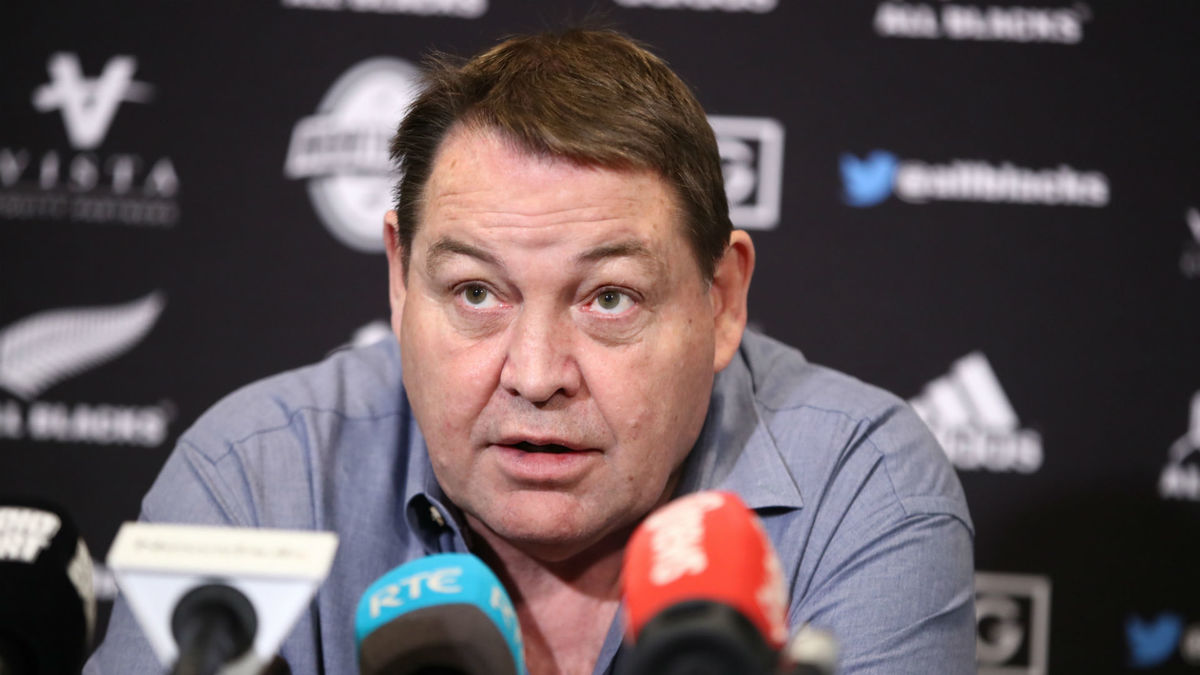Steve Hansen reveals All Blacks' biggest selection headache leading into World Cup

All Blacks head coach Steve Hansen is preparing himself to make some tough calls as the deadline for his World Cup squad inches closer and closer.
There is plenty of competition for spots throughout the side, with positions such as prop, midfield and the outside backs particularly log-jammed as World Cup contenders battle it out against one another in Super Rugby for a ticket to Japan.
However, it is the role of blindside flanker that has Hansen most concerned in the lead-up to the global showpiece event.
The All Blacks are yet to find a long-term replacement for veteran Jerome Kaino, who played the last of his 81 tests against the British and Irish Lions in 2017 before departing to Toulouse last year.
Liam Squire has been seen as Kaino’s most likely successor since then, playing in 15 tests in that timeframe, but the challenges of Vaea Fifita (eight tests) and Shannon Frizell (four) have complicated selection matters for Hansen.
Jackson Hemopo, Akira Ioane, Dalton Papalii and Jordan Taufua are also in contention, while Scott Barrett and Ardie Savea both possess the potential to play there if need be.
With no clear favourite to start in the number six jersey, Hansen told Newstalk ZB that he hoped someone would stake a claim for the starting role before the tournament commences in September.
“We’d like to really establish someone in JK’s old role at six,” he said.
“Liam Squire’s done a really good job there but he’s been injured. We’ve got Shannon, we’ve got Vaea, and Akira’s starting to play well for the Blues after a good season with Auckland.
“There’s people putting their hand up, but they’re probably not as established as we’d like going into a World Cup.”
Squire is working through an ongoing hip injury, and should be available for Super Rugby selection in a couple weeks’ time, while Frizell and Ioane have been standouts in the competition’s opening rounds for the Highlanders and Blues, respectively.
Hansen said that given the lack of established squad members in comparison to previous World Cup cycles, there is potential to for a bolter to be selected in the same ilk that Nehe Milner-Skudder was plucked from obscurity to star in 2015.
“This year, probably more than previous tournaments, there’s room, because we’ve got some important decisions to make in certain positions, it’s going to be about who puts their hands up and does it. In a couple of positions we probably don’t have as many [options] as we’d like.
“We’re still open to adding more names to [our selection discussions] as we watch Super Rugby. Most New Zealanders could pick 25 or so [of the World Cup squad], but it’s getting that last six or seven players right, that’s the difficult part and the art of a good selector.
“We’ve got good flexibility around what we want to select – the type of player we think we’re going to need for the tournament, they’ve got to be good athletes and have great mental fortitude, but they’ve also got to be able to do their job at a really high level. There’s no stone being left unturned.”
Hansen’s selection process will include more scrutiny being applied in the final rounds and play-offs of Super Rugby, with the ability to handle high-pressure situations playing a key role in uncovering a potential World Cup bolter.
“We’re looking for people who can show you, particularly in the business end of Super Rugby, that they can cope with the heat of the fire and the pressure that comes with it,” he said.
“That’s why the latter games of the tournament are so important because that’s when the pressure is really on.
“That will show you how they cope, but it’s another level when you get to the All Blacks, you haven’t just got your franchise looking at you, you’ve got the whole nation.
“For some, it can be overwhelming, and you’ve got to take the time with them so they can grow and learn to cope with it.”
In other news:










































































